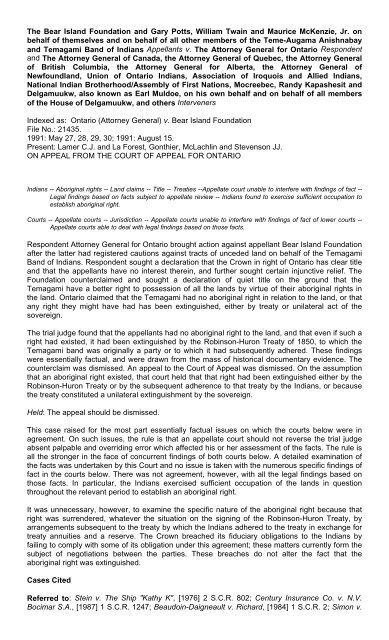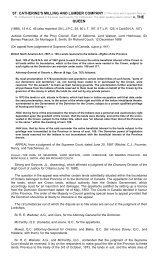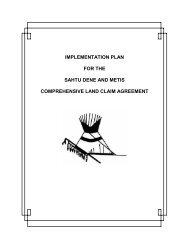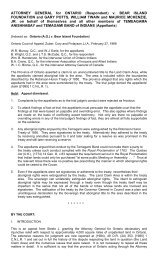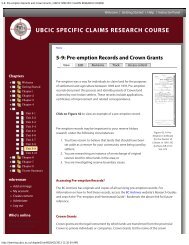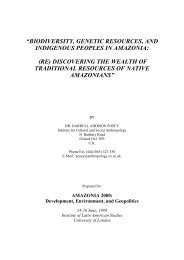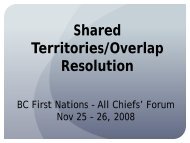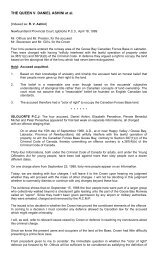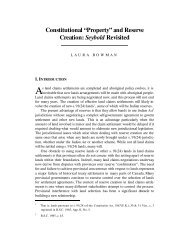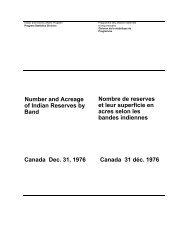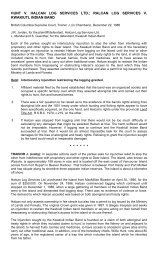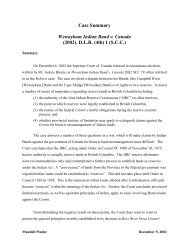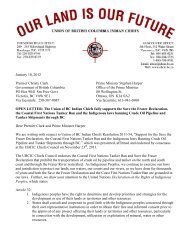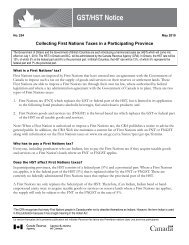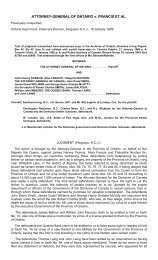The Bear Island Foundation and Gary Potts, William Twain and ...
The Bear Island Foundation and Gary Potts, William Twain and ...
The Bear Island Foundation and Gary Potts, William Twain and ...
You also want an ePaper? Increase the reach of your titles
YUMPU automatically turns print PDFs into web optimized ePapers that Google loves.
<strong>The</strong> <strong>Bear</strong> <strong>Isl<strong>and</strong></strong> <strong>Foundation</strong> <strong>and</strong> <strong>Gary</strong> <strong>Potts</strong>, <strong>William</strong> <strong>Twain</strong> <strong>and</strong> Maurice McKenzie, Jr. on<br />
behalf of themselves <strong>and</strong> on behalf of all other members of the Teme-Augama Anishnabay<br />
<strong>and</strong> Temagami B<strong>and</strong> of Indians Appellants v. <strong>The</strong> Attorney General for Ontario Respondent<br />
<strong>and</strong> <strong>The</strong> Attorney General of Canada, the Attorney General of Quebec, the Attorney General<br />
of British Columbia, the Attorney General for Alberta, the Attorney General of<br />
Newfoundl<strong>and</strong>, Union of Ontario Indians, Association of Iroquois <strong>and</strong> Allied Indians,<br />
National Indian Brotherhood/Assembly of First Nations, Mocreebec, R<strong>and</strong>y Kapashesit <strong>and</strong><br />
Delgamuukw, also known as Earl Muldoe, on his own behalf <strong>and</strong> on behalf of all members<br />
of the House of Delgamuukw, <strong>and</strong> others Interveners<br />
Indexed as: Ontario (Attorney General) v. <strong>Bear</strong> <strong>Isl<strong>and</strong></strong> <strong>Foundation</strong><br />
File No.: 21435.<br />
1991: May 27, 28, 29, 30; 1991: August 15.<br />
Present: Lamer C.J. <strong>and</strong> La Forest, Gonthier, McLachlin <strong>and</strong> Stevenson JJ.<br />
ON APPEAL FROM THE COURT OF APPEAL FOR ONTARIO<br />
Indians -- Aboriginal rights -- L<strong>and</strong> claims -- Title -- Treaties --Appellate court unable to interfere with findings of fact --<br />
Legal findings based on facts subject to appellate review -- Indians found to exercise sufficient occupation to<br />
establish aboriginal right.<br />
Courts -- Appellate courts -- Jurisdiction -- Appellate courts unable to interfere with findings of fact of lower courts --<br />
Appellate courts able to deal with legal findings based on those facts.<br />
Respondent Attorney General for Ontario brought action against appellant <strong>Bear</strong> <strong>Isl<strong>and</strong></strong> <strong>Foundation</strong><br />
after the latter had registered cautions against tracts of unceded l<strong>and</strong> on behalf of the Temagami<br />
B<strong>and</strong> of Indians. Respondent sought a declaration that the Crown in right of Ontario has clear title<br />
<strong>and</strong> that the appellants have no interest therein, <strong>and</strong> further sought certain injunctive relief. <strong>The</strong><br />
<strong>Foundation</strong> counterclaimed <strong>and</strong> sought a declaration of quiet title on the ground that the<br />
Temagami have a better right to possession of all the l<strong>and</strong>s by virtue of their aboriginal rights in<br />
the l<strong>and</strong>. Ontario claimed that the Temagami had no aboriginal right in relation to the l<strong>and</strong>, or that<br />
any right they might have had has been extinguished, either by treaty or unilateral act of the<br />
sovereign.<br />
<strong>The</strong> trial judge found that the appellants had no aboriginal right to the l<strong>and</strong>, <strong>and</strong> that even if such a<br />
right had existed, it had been extinguished by the Robinson-Huron Treaty of 1850, to which the<br />
Temagami b<strong>and</strong> was originally a party or to which it had subsequently adhered. <strong>The</strong>se findings<br />
were essentially factual, <strong>and</strong> were drawn from the mass of historical documentary evidence. <strong>The</strong><br />
counterclaim was dismissed. An appeal to the Court of Appeal was dismissed. On the assumption<br />
that an aboriginal right existed, that court held that that right had been extinguished either by the<br />
Robinson-Huron Treaty or by the subsequent adherence to that treaty by the Indians, or because<br />
the treaty constituted a unilateral extinguishment by the sovereign.<br />
Held: <strong>The</strong> appeal should be dismissed.<br />
This case raised for the most part essentially factual issues on which the courts below were in<br />
agreement. On such issues, the rule is that an appellate court should not reverse the trial judge<br />
absent palpable <strong>and</strong> overriding error which affected his or her assessment of the facts. <strong>The</strong> rule is<br />
all the stronger in the face of concurrent findings of both courts below. A detailed examination of<br />
the facts was undertaken by this Court <strong>and</strong> no issue is taken with the numerous specific findings of<br />
fact in the courts below. <strong>The</strong>re was not agreement, however, with all the legal findings based on<br />
those facts. In particular, the Indians exercised sufficient occupation of the l<strong>and</strong>s in question<br />
throughout the relevant period to establish an aboriginal right.<br />
It was unnecessary, however, to examine the specific nature of the aboriginal right because that<br />
right was surrendered, whatever the situation on the signing of the Robinson-Huron Treaty, by<br />
arrangements subsequent to the treaty by which the Indians adhered to the treaty in exchange for<br />
treaty annuities <strong>and</strong> a reserve. <strong>The</strong> Crown breached its fiduciary obligations to the Indians by<br />
failing to comply with some of its obligation under this agreement; these matters currently form the<br />
subject of negotiations between the parties. <strong>The</strong>se breaches do not alter the fact that the<br />
aboriginal right was extinguished.<br />
Cases Cited<br />
Referred to: Stein v. <strong>The</strong> Ship "Kathy K", [1976] 2 S.C.R. 802; Century Insurance Co. v. N.V.<br />
Bocimar S.A., [1987] 1 S.C.R. 1247; Beaudoin-Daigneault v. Richard, [1984] 1 S.C.R. 2; Simon v.
<strong>The</strong> Queen, [1985] 2 S.C.R. 387; R. v. Sparrow, [1990] 1 S.C.R. 1075.<br />
APPEAL from a judgment of the Ontario Court of Appeal (1989), 68 O.R. (2d) 394, 58 D.L.R. (4th)<br />
117, [1989] 2 C.N.L.R. 73, 32 O.A.C. 66, 4 R.P.R. 252, dismissing an appeal from a judgment of<br />
Steele J. (1984), 15 D.L.R. (4th) 321. Appeal dismissed.<br />
W. Ross Murray, Q.C., <strong>and</strong> Wendy J. Earle, for the appellants.<br />
J. T. S. McCabe <strong>and</strong> Lorna E. Boyd, for the respondent.<br />
W. I. C. Binnie, Q.C., W. A. Hobson, Q.C., <strong>and</strong> Susan L. Reid, for the intervener the Attorney<br />
General of Canada.<br />
René Morin, for the intervener the Attorney General of Quebec.<br />
D. M. M. Goldie, Q.C., <strong>and</strong> Norman J. Prelypchan, for the intervener the Attorney General of<br />
British Columbia.<br />
Robert J. Normey, for the intervener the Attorney General for Alberta.<br />
Deborah J. Paquette, for the intervener the Attorney General of Newfoundl<strong>and</strong>.<br />
<strong>William</strong> B. Henderson <strong>and</strong> Alan Pratt, for the intervener Union of Ontario Indians.<br />
Brian A. Crane, Q.C., for the intervener Association of Iroquois <strong>and</strong> Allied Indians.<br />
Peter W. Hutchins, Diane H. Soroka <strong>and</strong> Franklin S. Gertler, for the intervener National Indian<br />
Brotherhood/Assembly of First Nations.<br />
Murray Klippenstein <strong>and</strong> <strong>Gary</strong> Stein, for the interveners Mocreebec <strong>and</strong> R<strong>and</strong>y Kapashesit.<br />
David Paterson <strong>and</strong> Louise M<strong>and</strong>ell, for the intervener Delgamuukw, also known as Earl Muldoe,<br />
on his own behalf <strong>and</strong> on behalf of all members of the House of Delgamuukw, <strong>and</strong> others.<br />
<strong>The</strong> following is the judgment delivered by<br />
THE COURT -- <strong>The</strong> respondent Attorney General for Ontario brought action against the appellant,<br />
the <strong>Bear</strong> <strong>Isl<strong>and</strong></strong> <strong>Foundation</strong>, after the latter had registered cautions against tracts of unceded l<strong>and</strong><br />
north of Lake Nipissing, Ontario, on behalf of the Temagami B<strong>and</strong> of Indians. By this action, the<br />
respondent sought a declaration that the Crown in right of Ontario has clear title to the l<strong>and</strong> in<br />
question <strong>and</strong> that the appellants have no interest therein, <strong>and</strong> further sought certain injunctive<br />
relief. <strong>The</strong> <strong>Foundation</strong> counterclaimed <strong>and</strong> sought a declaration of quiet title on the ground that the<br />
Temagami have a better right to possession of all the l<strong>and</strong>s by virtue of their aboriginal rights in<br />
the l<strong>and</strong>. Ontario claimed that the Temagami had no aboriginal right in relation to the l<strong>and</strong>, or that<br />
any right they might have had has been extinguished, either by treaty or unilateral act of the<br />
sovereign.<br />
Steele J. ((1984), 49 O.R. (2d) 353) found that the appellants had no aboriginal right to the l<strong>and</strong>,<br />
<strong>and</strong> that even if such a right had existed, it had been extinguished by the Robinson-Huron Treaty<br />
of 1850, to which the Temagami b<strong>and</strong> was originally a party or to which it had subsequently<br />
adhered. <strong>The</strong>se findings were essentially factual, <strong>and</strong> were drawn from the mass of historical<br />
documentary evidence adduced over the course of 130 days of trial. Steel J. also dismissed the<br />
counterclaim.<br />
Reference may be made here to the reasons why Steele J. refused to find that the Indians had<br />
established an aboriginal right. <strong>The</strong> gist of these reasons may be found in the following passage<br />
from his reasons for judgment, at p. 373:<br />
I will deal with the entitlement of the defendants to aboriginal rights in the L<strong>and</strong> Claim Area. I find<br />
that the defendants have failed to prove that their ancestors were an organized b<strong>and</strong> level of<br />
society in 1763; that, as an organized society, they had exclusive occupation of the L<strong>and</strong> Claim<br />
Area in 1763; or that, as an organized society, they continued to exclusively occupy <strong>and</strong> make<br />
aboriginal use of the L<strong>and</strong> Claim Area from 1763 or the time of coming of settlement to the date<br />
the action was commenced.<br />
An appeal to the Ontario Court of Appeal ((1989), 68 O.R. (2d) 394) was dismissed. On the
assumption that an aboriginal right existed, the court held that that right had been extinguished<br />
either by the Robinson-Huron Treaty or by the subsequent adherence to that treaty by the Indians,<br />
or because the treaty constituted a unilateral extinguishment by the sovereign.<br />
This case, it must be underlined, raises for the most part essentially factual issues on which the<br />
courts below were in agreement. On such issues, the rule is that an appellate court should not<br />
reverse the trial judge in the absence of palpable <strong>and</strong> overriding error which affected his or her<br />
assessment of the facts: Stein v. <strong>The</strong> Ship "Kathy K", [1976] 2 S.C.R. 802; Century Insurance Co.<br />
v. N.V. Bocimar S.A., [1987] 1 S.C.R. 1247; Beaudoin-Daigneault v. Richard, [1984] 1 S.C.R. 2.<br />
<strong>The</strong> rule is all the stronger in the face of concurrent findings of both courts below. We have<br />
undertaken a detailed examination of the facts on this basis. We do not take issue with the<br />
numerous specific findings of fact in the courts below, <strong>and</strong> it is, therefore, not necessary to<br />
recapitulate them here.<br />
It does not necessarily follow, however, that we agree with all the legal findings based on those<br />
facts. In particular, we find that on the facts found by the trial judge the Indians exercised sufficient<br />
occupation of the l<strong>and</strong>s in question throughout the relevant period to establish an aboriginal right;<br />
see, in this context, Simon v. <strong>The</strong> Queen, [1985] 2 S.C.R. 387; R. v. Sparrow, [1990] 1 S.C.R.<br />
1075. In our view, the trial judge was misled by the considerations which appear in the passage<br />
from his reasons quoted earlier.<br />
It is unnecessary, however, to examine the specific nature of the aboriginal right because, in our<br />
view, whatever may have been the situation upon the signing of the Robinson-Huron Treaty, that<br />
right was in any event surrendered by arrangements subsequent to that treaty by which the<br />
Indians adhered to the treaty in exchange for treaty annuities <strong>and</strong> a reserve. It is conceded that<br />
the Crown has failed to comply with some of its obligations under this agreement, <strong>and</strong> thereby<br />
breached its fiduciary obligations to the Indians. <strong>The</strong>se matters currently form the subject of<br />
negotiations between the parties. It does not alter the fact, however, that the aboriginal right has<br />
been extinguished.<br />
For these reasons, the appeal is dismissed.<br />
Appeal dismissed.<br />
Solicitors for the appellants: Borden & Elliot, Toronto.<br />
Solicitor for the respondent: <strong>The</strong> Attorney General for Ontario, Toronto.<br />
Solicitors for the intervener the Attorney General of Canada: McCarthy, Tétrault, Toronto.<br />
Solicitor for the intervener the Attorney General of Quebec: <strong>The</strong> Attorney General of Quebec, Ste-<br />
Foy.<br />
Solicitor for the intervener the Attorney General of British Columbia: <strong>The</strong> Attorney General of British<br />
Columbia, Victoria.<br />
Solicitor for the intervener the Attorney General for Alberta: <strong>The</strong> Attorney General for Alberta,<br />
Edmonton.<br />
Solicitor for the intervener the Attorney General of Newfoundl<strong>and</strong>: <strong>The</strong> Attorney General of<br />
Newfoundl<strong>and</strong>, St. John's.<br />
Solicitors for the intervener Union of Ontario Indians: Blaney, McMurtry, Stapells, Toronto.<br />
Solicitors for the intervener Association of Iroquois <strong>and</strong> Allied Indians: Gowling, Strathy &<br />
Henderson, Ottawa.<br />
Solicitors for the intervener National Indian Brotherhood/Assembly of First Nations: Hutchins,<br />
Soroka & Dionne, Montréal.<br />
Solicitors for the interveners Mocreebec <strong>and</strong> R<strong>and</strong>y Kapashesit: Iler, Campbell & Associates,<br />
Toronto.<br />
Solicitors for the intervener Delgamuukw, also known as Earl Muldoe, on his own behalf <strong>and</strong> on<br />
behalf of all members of the House of Delgamuukw, <strong>and</strong> others: M<strong>and</strong>ell Pinder, Vancouver.


